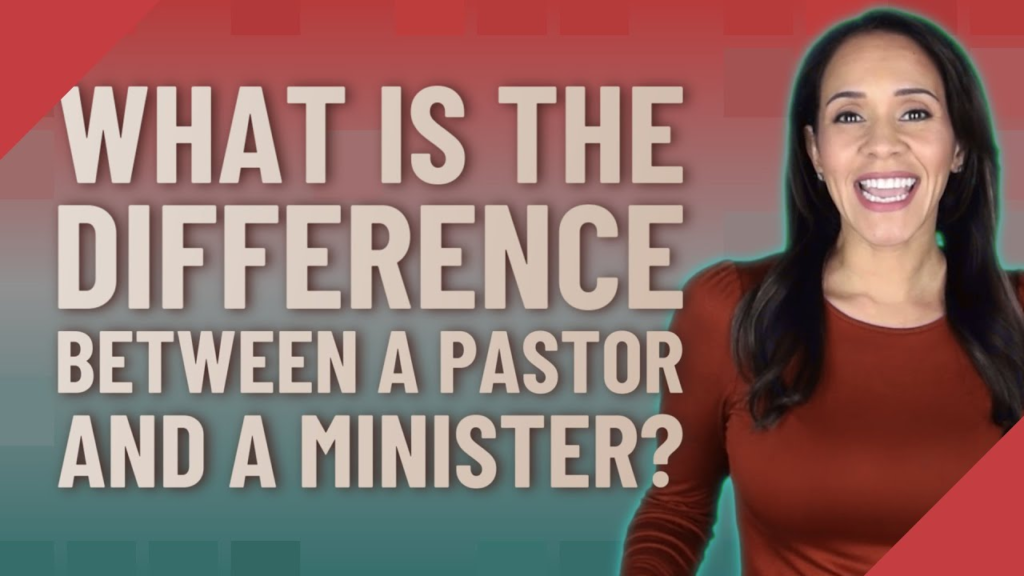What’s the difference between a minister and a pastor? What is the difference between ordained minister and pastor? What is the difference between a pastor and a preacher? A minister is a clergy member who has been ordained, or formally recognized and licensed by the church he or she works for. A pastor is a layperson who serves as a spiritual leader of a congregation.
There are many names given to the preachers of the faith. Across many specific religions, the roles and titles of these people may somehow vary. So many people become confused with the terms: priest, reverend, pastor, and minister. It is probably the pastor and the minister that have the most confusing distinction.

What is the Definition of a Reverend?
The definition of a reverend is a clergyman who leads religious services. The term Reverend has traditionally been used for Christian ministers. It can be used in any religion as a generic title for someone who is considered to have authority over the congregation or community they serve, but it’s more often found with Protestant denominations (e.g., Methodism). Jump to Reverened vs Pastor: What’s the Difference?
Explanation of the Title “Reverend”
| Component | Description |
|---|---|
| Title | Reverend |
| Pronunciation | /ˈrɛv.ər.ənd/ |
| Origin | Derived from the Latin word “reverendus,” meaning “worthy of being revered.” |
| Usage | Predominantly used in Christian denominations as a prefix to the names of ordained ministers or pastors. |
| Associated Roles | Pastor, Minister, Priest, Bishop, among others. |
| Position in Hierarchy | Typically a general title of respect for any ordained individual, irrespective of their specific role or rank within a denomination. Some denominations may have specific guidelines. |
| Denominational Variance | The exact role and responsibilities of a “Reverend” can vary by denomination and by individual church. Some denominations might reserve the title for specific positions, while others might use it more broadly. |
| Related Titles | Reverend Doctor (Rev. Dr.), Very Reverend, Right Reverend, among others. These can indicate higher or specific roles within a church or denomination. |
| Context of Use | The title is often used formally in written correspondence or when addressing the individual in a religious setting. For instance, “Reverend Smith” or “The Reverend John Smith.” |
The definition of “reverend” comes from Latin words meaning “worthy”, meaning worthy of respect and honor due to their position within a society or church hierarchy; hence why this role carries such weight in Christianity today! However, there are some differences between what makes up each type: What Religion is a Reverend vs Pastor?
What’s The Difference Between A Minister And A Pastor

In the Bible, it is clearly defined that a pastor is a person holding an office. He must meet a certain criteria or qualification in order for him to become one. In the book of Titus and 1st Timothy, a pastor is described chiefly as an elder. The term itself is derived from the Greek word “poimain,” which literally means “shepherd.” In the first chapter of Titus, pastors must be appointed in every city or district. As such, they must act as the area’s overseers. Paul’s conversation to a group of elders is also stated in the book of Acts with him exclaiming to the group that they have been regarded as the overseers who’ll shepherd God’s church. This clearly shows that a pastor is an elder.
Furthermore, Titus 1:5-9 also highlights the other important qualifications of a pastor. First, he must be a man above reproach. Second, he must be wed to only one wife. Third, he must possess the following qualities: prudent, temperate, hospitable, respectable, knows how to teach, not a wine addict, non-aggressive, peace loving, gentle, and not easily enslaved by the passion of money. Fourth, he should be the father of his very own household. Lastly, he shouldn’t be a newly converted individual and must bear irrefutable respect from people outside the church.
Difference between ordained minister and pastor
In the Roman Catholic sense, the pastor is the priest of a certain parish (one single church community) unlike in the Protestant sense wherein it is more of a job title offered to someone who is able to work as the religious head. In addition, ministers are generally found in the Protestant setup. To become one, this person should have been officially ordained. He can be an ordained minister but is not immediately assumed to perform the duties of a pastor whereas a pastor is already assumed to be able to perform the duties of a minister. When you become ordained as a minister, it means that you have been duly acknowledged as a trusted, religious figure or authority.
Summary:
1.The term “pastor” means an “elder, overseer or shepherd.”
2.The pastor of the Roman Catholic Church is the priest of the parish.
3.The pastor of the Protestant Church is the religious leader. It’s more of a job position or title.
4.The term “minister” means “preacher.” All pastors can perform the duties of a minister, but not all ministers can act as pastors.
what is the difference between a pastor and a preacher
There are a few differences between a pastor and a preacher, but they both have one thing in common: they’re both responsible for the spiritual well-being of their congregations.
A pastor is responsible for preaching sermons to the congregation, leading prayers, conducting baptisms and funerals, and performing other religious ceremonies. A preacher is someone who preaches sermons to their congregation; they may also be responsible for leading prayers and performing other religious ceremonies.
Pastor and preacher are two words that are often used interchangeably. However, there is a difference between the two.
A pastor is someone who holds a position of authority in a church. They might be responsible for leading the congregation, preaching sermons, teaching Bible study classes and performing baptisms.
A preacher is one who preaches sermons or gives speeches to an audience.
| Quality | Pastor | Reverend |
|---|---|---|
| Role | Pastors are typically leaders of a local church congregation, charged with preaching, teaching, and providing spiritual guidance to their members. | The term ‘Reverend’ is a respectful title given to many ordained clergy across different Christian denominations. It’s not a role, but a title that can apply to pastors, priests, bishops, etc. |
| Relation to Christian Faith | A pastor’s role is rooted in the Christian faith’s principles of spreading the Gospel, shepherding the flock, and providing spiritual care. | As a title, ‘Reverend’ emphasizes the respect and reverence given to those who are ordained to serve in various roles in the Christian faith. |
| Service | Pastors are called to serve their congregations and communities, reflecting Jesus’ teachings about serving others (Mark 10:45). | Those who hold the title of ‘Reverend’ are recognized as being in service to God and their congregations, fulfilling the various duties of their specific roles. |
| Teaching | Pastors play a vital role in teaching and interpreting the Bible for their congregations (2 Timothy 4:2). | Regardless of their specific roles, all who are called ‘Reverend’ are generally involved in teaching and upholding Christian doctrines. |
| Pastoral Care | Providing counsel and comfort to those in need is a central aspect of a pastor’s role (1 Thessalonians 5:14). | While this aspect may be more associated with pastoral roles, many who are titled ‘Reverend’ also engage in providing pastoral care as part of their duties. |